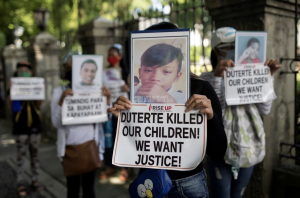By: Brandon Cho
Journal of Global Rights and Organizations, Associate Articles Editor
THE HAGUE, Netherlands – On January 26, 2023, the International Criminal Court (ICC) granted investigations into alleged crimes against humanity to resume in the Philippines after the Court had taken a step back at Manila’s request in 2021. Upon careful review of the materials provided by the Republic of the Philippines, the Court is not convinced that a proper and sufficient investigation was being conducted by the powers within the Philippines.

Former President Rodrigo Duterte began an intensified war on drugs near the onset of his presidential term which claimed more than 6,000 lives mostly among the poor. The police claim that many of these killings were against suspects of drug peddling or being drug lords, and Duterte openly ordered police to shoot anyone who resisted arrest. Thousands more are estimated to have been killed by vigilante gunmen who may have been deployed by the police. While the infamous part of the campaign and Duterte’s term took place from 2016 to 2019, the “war on drugs” campaign began in 2011. In response on September 15, 2021, the Office of the Prosecutor (OTP) initiated an inquiry into the crackdown alleging crimes against humanity committed in the Philippines from November 1, 2011, to March 16, 2019.
Under article 18(2) of the Rome Statute “[…] a State may inform the Court that it is investigating or has investigated its nationals or others within its jurisdiction with respect to criminal acts […]. At the request of that State, the Prosecutor shall defer to the State’s investigation of those persons unless the Pre-Trial Chamber, on the application of the Prosecutor, decides to authorize the investigation.”
Following the initial inquiry, the Republic of Philippines requested the investigation be deferred in favor of the country’s internal investigation. In addition, the Philippines, a party to the Rome Statute since November 1, 2011, withdrew from the Statute on March 17, 2018 which took effect on March 17, 2019. The Philippines Justice Secretary, Jesus Crispin Remulla, does not welcome the ICC and said that the ICC cannot impose itself on Philippines’ sovereignty because it is no longer a signatory of the Statute.
Duterte refuses to apologize for the mass killings and assumes full responsibility for the outcome. He claims the crackdown was lawfully directed against drug lords and dealers and denies extrajudicial killings.
From what has been gathered here, it is unclear if the ICC has jurisdiction over the Republic of Philippines. While the drug war killings occurred while the Philippines was a party to the Statute, it has since withdrawn its cooperation with the Statute before the investigation began. There is an obvious conflict between fear of unfair prejudice and the principles of accountability. A proper investigation by the ICC should be carried out for the interest of justice. How this situation develops will mean everything to the families of drug war victims still seeking justice in long, drawn-out cases.
For further information, please see:
AP News – Intl judges reopen Philippines ‘war on drugs’ investigation – 26 Jan. 2023
Reuters – Philippines defiant, says won’t cooperate with ICC investigation – 27 Jan. 2023
Reuters – Philippines’ Duterte says he takes full responsibility for drugs war – 21 Oct. 2021
Reuters – Philippines’ Duterte says will never apologize for drug war deaths – 4 Jan. 2022